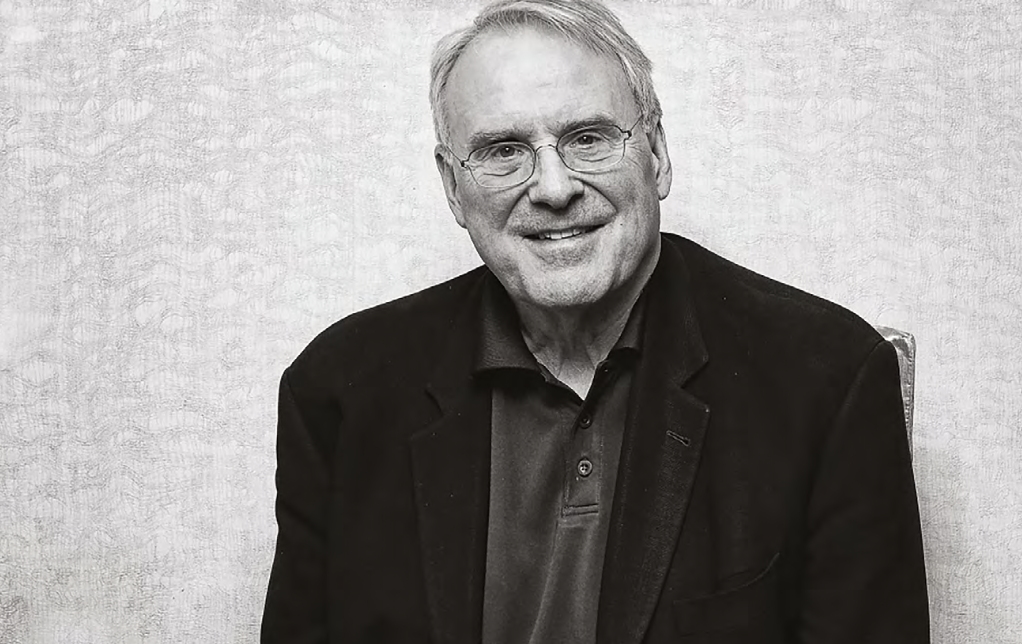By Peter Feniak
The Hockey Hall of Famer is always looking for something interesting to do; fortunately, he finds a great many things interesting
Ken Dryden, the brilliant Montreal Canadiens goaltender who left hockey early to pursue other interests, doesn’t read his own press. “I learned midway through my career in Montreal not to read stuff about myself,” he says. “It’s too distracting. The good stuff is too good, and the bad stuff’s too bad—and neither is me. Plus, I’ve got today to deal with, so I can’t be distracted by the rest.”
The quintessential modest Canadian, Dryden has lived a life of accomplishment—with some daring detours. He doesn’t trumpet his achievements, but he’s been a lawyer, a television commentator, a university lecturer, a polit- ician, a cabinet minister, a sports executive, and a best- selling writer. He is an Officer of the Order of Canada and a member of the Hockey Hall of Fame. “I’ve been able to do the things that I thought were interesting to do and that I liked to do,” he says simply.
In his 70s, Dryden (now 77) launched an ambitious project that would reveal more about his amazing life. He reconnected with his high-school classmates—all born in 1946 or 1947. The result: The Class: A Memoir of a Place, a Time, and Us (McClelland & Stewart, 2023) traces their lives from high school to the senior years decades later. A marvel of recollection, the book ponders what he calls the puzzle of their times.
Theirs was an “advanced” class—the “brain class,” some said. Most of the 30-plus students stayed together from grades nine to 13, Dryden remembers, “for five years…from nine in the morning until three-twenty in the afternoon, Monday to Friday, September to June.” They graduated from Etobicoke High School (in a suburb west of Toronto) in 1965. “It was time to go in the direction of your own choosing, to start your own race,” Dryden says.
He had been a top student and top student athlete. “High school is about feeling your way…a lot of awkward times and moments and things you aren’t really prepared for,” he remembers. At 18, he says, “I wanted something new; I wanted an adventure.” Intrigued by the United States and its dynamic culture, he headed south, to Ithaca in upstate New York and an athletic scholarship at Cornell University.
Dryden became one of the institution’s great sports stars. In his sophomore year, he was the formidable goal- tender who led the Cornell Big Red hockey team to the 1967 national championship. Dryden was a three-time All-American. He was also invigorated by ’60s campus life—politics, art, civil-rights protests. (He saw Joan Baez sing “We Shall Overcome.”) And he met Lynda, his future wife. Graduating with a B.A. in history, he held off pro hockey to begin studying for a law degree. Finally, he joined the Montreal Canadiens late in the 1970-71 season. Filling in for an injured player, Dryden was unforgettable. He led the team to the Stanley Cup championship.
The Canadiens of the 1970s would become legendary, with future Hall of Famers—everyone from Lafleur, Lapointe, and Cournoyer to Robinson, Gainey, and Shutt. Fans fondly remember the image of Dryden, the team’s lanky (six-foot-four) star goaltender, as he stood between plays, his heavy gloves folded, leaning on a very long goalie stick as if he hadn’t a care in the world. He thwarted the best shooters in the game. (To Boston’s frustrated Phil Esposito, he was “that thieving giraffe.”) But at age 31, the great goalie walked away from pro hockey.
Dryden’s early retirement shocked the hockey world. In eight dazzling seasons, he had lifted the Stanley Cup six times, been a six-time NHL All-Star, been in net as Canada won the famous 1972 Summit Series with the USSR. And then he was gone. The press wasn’t kind. Dryden would say later: “I wanted to give myself the time and the chance to do something else that I hoped would be useful and interesting and that I could do well. It just felt like it was time to go.”
Always inspired by challenges, Dryden had completed his law degree at McGill University during a season away from hockey—partly the result of a contract dispute with the Canadiens—but soon after he began practising law back in Toronto post-retirement, he decided it wasn’t for him. Interesting opportunities soon emerged. Above all, he found great satisfaction in writing. He had kept notes while with the Canadiens, and those notes grew into The Game (Macmillan Canada, 1983), a memoir of his last season. It’s often called “the best hockey book ever written.” Admired books on public education, on Canada as a nation, and on hockey violence were to come.
The “Interest Ethic”
Dryden’s eighth book, Scotty: A Hockey Life Like No Other (Penguin Random House, 2019), shone with the author’s conversations with his former coach, Scotty Bowman—a legendary winner. Scotty soared to number one on the national bestseller list. Dryden had captured the great coach through a long series of phone interviews. He began to wonder if he could repeat that process with his classmates from Etobicoke High.
“Very few of us had maintained much contact,” Dryden recalls. “I remember thinking, ‘Okay, who may have a bit of a list?’ I contacted Marilyn Adams. She had about 12 people.” Phone numbers were obsolete, email addresses were scarce. But the few he reached knew other classmates. “The list grew,” he says. “By the time I got to about 15, I knew I had a project.” One classmate couldn’t be found. One declined. In the time of COVID, the rest were home. Dryden’s six-month series of interviewing may seem a heavy workload, but he never saw it that way: “I don’t think I have a work ethic—it’s an ‘interest ethic.’ The process doesn’t feel like work; it’s just really fascinating. Every conversation is going to generate something that I didn’t know before, had never thought about. A lot had happened. And it just got more and more interesting.”
Careful about going “too deep, too fast,” he began inter- views by asking his classmates about their parents. It became a strength of the book. “It began just relating a story—you know, ‘Well, my father was born in Port Elgin’ or something…facts that they knew.” Soon, he laughs, “it was clear to me that I knew nothing about the parents when we were classmates—or anything about my own parents either.” (Dryden’s father, Murray, was born into a large farm family near Domain, Man. In Ontario, he became an energetic salesman of construction supplies. With his wife, Margaret [Campbell], a teacher who shifted to work at home with the kids, Dave, Ken, and Judy, he founded the charity Sleeping Children Around the World, providing bed kits for the needy.)
In the book, the conversations move from parent talk to more personal territory. Decades unfold with descriptions of marriage, family, divorce, changing professions, and coming out. There is elation and discouragement as well as surprising events. One classmate becomes a pioneer in Canadian theatre, another makes it to the Olympic Games, another wins $4 million in a lottery.
Most “brain-class” women choose work in the fields that are open to them at the time—nursing and teaching; they help to grow those professions. In other fields, classmates rise in finance, engineering, and the new world of computer technology. Decisions have some leaving the city, leaving the country, leaving jobs. There is ambition thwarted, disappointment, aging, crisis.
One story has a classmate walking nervously into the funeral of a young man he had never met. Martin Kruze had committed suicide, unable to escape a horrific past. The classmate is Ken Dryden, president of the Toronto Maple Leafs, nervous but finally acknowledging the sad story of sexual abuse of young boys by former employees of Maple Leaf Gardens.
Looking back, “there grew an understanding of the possibilities that rose in Canada in the postwar world,” Dryden writes. “After years of uncertainty, parents locked into a calm and modest prosperity. And many of their children sought for something more.”
The postwar children (Dryden won’t say “baby boomers”) met a surge of change, from Elvis to the joys of Expo 67 and the Centennial Year. They saw separatism in Quebec, labour unrest, and the rise of women’s rights and environmentalism. Immigration grew rapidly, as did technology and social media.
What does The Class reveal about the “puzzle” of his classmates’ postwar lives? Dryden replies in his thoughtful voice: “We do certain things in our lives. We don’t really know what they’re going to lead to; we just do them. The book ends with ‘Where we’re going is where we end up.’ That’s what it is.”
“He’s a Genius”
Dryden doesn’t dwell on his generation’s legacy, but he does point out that modern science and technology have created longer, healthier lives. The upcoming generations, the kids and grandkids, he believes, “are going to make of their tomorrows something amazing. I have no idea what it will be. The big challenge is finding a way to deal with climate change.”
The classmates were invited to the launch of The Class in late 2023 and given copies of the book. Dryden worried that some episodes told frankly would cause unhappiness. He remembered the press in his hockey years: “Anything that is not nice, you’re going to react to—and it’s going to be awkward.” There was little early response. “Finally,” he says, “emails started to come in. And almost all of them said, ‘I’ve read it…and I’ve read it a second time.’” He admits with a smile, “I wasn’t expecting that.”
For our interview, Dryden spoke from Boston, where he and Lynda were visiting their daughter, Sarah, and her family. Together, he says, they watched determined runners face the famously steep “Heartbreak Hill,” which comes at the 20-mile mark of the Boston Marathon. And Dryden remembers a distance-running classmate: “Wayne Yetman ran up that hill—50 years back. I can hard- ly walk up it now.” That classmate and the others have become a part of his life again.
As the years passed, Dryden grew to be admired for his work “post-hockey.” The late veteran Montreal journalist Red Fisher didn’t hold back, once marvelling: “I think he’s a genius. He can do everything he sets out to do. When he puts his mind to doing something, whether it’s on the ice or off the ice, nobody does it like Ken Dryden.”
Is The Class Dryden’s last hurrah? It seems unlikely. He does enjoy relaxing on slow drives through the Ontario countryside with Lynda. But as for his life’s work, he’s clear: “I don’t think about retiring. I just want to do what I like to do. Stuff is interesting.”






